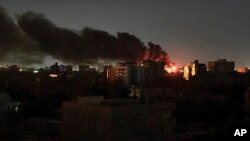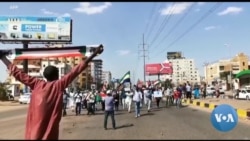U.S. officials in Congress and the White House on Tuesday urged Sudan's warring parties to stand down after four days of clashes in the capital, but analysts say Washington's leverage over Khartoum may be limited.
Fighting in Khartoum sparked Saturday between members of the Sudanese Armed Forces and the paramilitary Rapid Support Forces. Their leaders – SAF head General Abdel-Fattah Burhan and RSF chief General Mohammed Hamdan Dagalo, popularly known as Hemedti – joined forces to mount a 2021 coup that returned the country to military rule. The two men have since turned on each other, amid squabbles over power-sharing in the new government.
On Tuesday, White House press secretary Karine Jean-Pierre reiterated calls made by the top U.S. diplomat and the White House National Security Council for an immediate cease-fire without conditions.
But, when asked by VOA, Jean-Pierre declined to say what the consequences would be if the warring parties didn't listen.
"Look, you know, we've been very clear about the importance of de-escalating," she said. "And you've heard Secretary [of State Antony] Blinken speak to this. You heard my colleague from NSC speak to this as well. And so, I'm just not going to go beyond what they have said."
Earlier in the day, Blinken, speaking from a meeting of foreign ministers of the Group of Seven in Japan, said that he delivered a message to both leaders.
"This morning, I made calls to Generals Burhan and Hemedti, urging them to agree to a 24-hour cease-fire to allow Sudanese to safely reunite with their families and to obtain desperately needed relief supplies," he said.
U.S. lawmakers familiar with the continent say the stakes are high.
On Tuesday, Senator Chris Coons of Delaware, a member of the Senate Foreign Relations Committee, told VOA, "I have not given up hope that there is still a path towards an end to the violence, but we need to prepare for the very real possibility that Sudan is about to descend into all-out civil war.
"My concern is that this may quickly become a proxy war. That other more powerful, more militarily sophisticated countries in the region may begin sending drones, airpower – possibly even munitions or troops," Coons said.
That is an assessment shared by analysts who study the region.
Six of Sudan's neighbors – Central African Republic, Chad, Eritrea, Ethiopia, Libya and South Sudan – have experienced conflict in the past few years.
"There's a history in this region of these countries getting involved in the other's internal conflicts," Cameron Hudson, a senior associate at the Center for Strategic and International Studies, told VOA via Zoom.
"All of these countries have rebels on various payrolls, more than willing to join this fight. And certainly all of these countries have an interest and a stake in the ultimate outcome of who wins this fight," Hudson said. "And so I think the longer this drags on, there's every reason to believe that the neighbors are increasingly going to see an opportunity to get involved."
He added that outside actors like Russia's mercenary Wagner Group, which has other activities in the Sahel region, may also see an opportunity.
"It's a very dangerous situation for Washington when we look at the regional picture," Hudson said.
But Washington has little room to maneuver. Ties with Khartoum have long been strained, and the U.S. suspended assistance to Sudan during the 2021 coup.
U.S. lawmaker Coons was involved with the effort to remove Sudan from a state sponsor of terrorism list in 2020. He said the tense relationship between Washington and Khartoum means that other players, such as the African Union and humanitarian organizations like the World Food Program, need to be involved.
"Look, we need to do whatever we can to reduce the loss of life to restore stability, and to show a clear path forward towards a resolution of negotiations," Coons said. "We do have some leverage, but there's other players in the region that also have a lot at stake and some leverage and we need to work with them in close coordination."
CSIS' Hudson said this may be the only viable path.
"I think the challenge here is that the leverage that Washington has left is not leverage that it wants to put on the table, and that's the use of punitive measures," Hudson said.
"I think for the last six months you've seen Washington, and even since the coup, using an engagement strategy and an incentive strategy to try to bring the generals around to relinquishing power," he said. "The problem is that in Sudan's history, these generals don't have a history of responding to incentives. Just like they govern the country through fear, intimidation and their own punitive measures, that's what they respond to themselves."
Washington is left facing the toughest question of all: whom to back in this two-sided conflict?
Hudson said there is a middle ground.
"I think we're backing the Sudanese people, is who we're backing," he said. "We're on the side of the Sudanese civilians. We've been trying to restore civilian rule to the country since the coup d'etat in October 2021. And that has been the focus of U.S. diplomacy on the ground."
Coons said Tuesday that his committee was working toward a peaceful resolution.
"Sudan is a country of vast potential," he said. "It could be the breadbasket of the whole region.
"The civilians of Sudan showed real bravery and determination in leading the demonstrations that led to the overthrow of Bashir. To have them slide so quickly, so far backwards, into brutal internal fighting is disheartening. I am talking with leadership here, this week, about our options for the path forward," he said.






